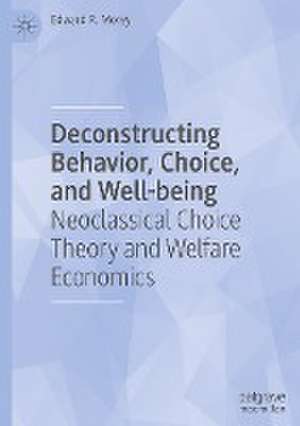Deconstructing Behavior, Choice, and Well-being: Neoclassical Choice Theory and Welfare Economics
Autor Edward R. Moreyen Limba Engleză Hardback – 4 noi 2023
In this book, Edward R. Morey contrasts neoclassical choice theory with behavioral models and findings in psychology, neuroscience, evolutionary biology, and animal behavior. The book addresses the fundamental idea within economics that behaviors are chosen, and it explains why other disciplines disagree. The chapters touch on modeling behavior, judging behavior, and policies.
Morey breaks down judgment using the ethics of welfare economics, and it compares and contrasts this recognized approach with others, including Mill’s liberalism, virtue ethics, duty-based ethics, Buddhist ethics, and utilitarianism.
Preț: 791.88 lei
Preț vechi: 965.71 lei
-18% Nou
Puncte Express: 1188
Preț estimativ în valută:
151.53€ • 165.11$ • 127.68£
151.53€ • 165.11$ • 127.68£
Carte tipărită la comandă
Livrare economică 23 aprilie-07 mai
Preluare comenzi: 021 569.72.76
Specificații
ISBN-13: 9783031367113
ISBN-10: 3031367111
Ilustrații: XXVII, 456 p. 31 illus., 28 illus. in color.
Dimensiuni: 148 x 210 mm
Greutate: 0.73 kg
Ediția:1st ed. 2023
Editura: Springer Nature Switzerland
Colecția Palgrave Macmillan
Locul publicării:Cham, Switzerland
ISBN-10: 3031367111
Ilustrații: XXVII, 456 p. 31 illus., 28 illus. in color.
Dimensiuni: 148 x 210 mm
Greutate: 0.73 kg
Ediția:1st ed. 2023
Editura: Springer Nature Switzerland
Colecția Palgrave Macmillan
Locul publicării:Cham, Switzerland
Cuprins
Introduction.- Part I: An ordering of paths, well-being, and economics: how to make you, a chimp, or even a cactus, better off?.- Chapter 1: Economicus: assumptions of a neoclassical theory of behavior, and their implications— my take.- Chapter 2: Welfare (well-faring) economics as a theory of what is right and wrong—my take.- chapter 3: Could economicus be the product of evolution rather than the creation of God?.- Chapter 4: Wanting versus liking, and happiness: an electrical/chemical stew.- Chapter 5: Does consuming more increase WB? Is getting rich the path to happiness?.- Chapter 6: Common quirks, incorrect beliefs, and flawed choosing.- Chapter 7: The endowment effect.- Chapter 8: Returning to whether all the different kinds of WB are commensurable and whether all the different bearers-of-WB are comparable.- Part II: What is a choice? Choice or the illusion of choice?.- Chapter 9: How would you define a choice? And the difference between a choice and the experience/sense of making a choice.- Chapter 10: The evidence on conscious choice.- Part III: Most moral philosophers are not welfare consequentialists, so what are they?.- Chapter 11: A primer on welfare economics vs. other ethics.- Chapter 12: A bit more on welfare economics, external effects, and interpersonal comparisons of WB.- Epilogue: Do you make choices, and if so, has your choosing made you happy?.
Notă biografică
Edward R. Morey is a Professor Emeritus at the University of Colorado, Boulder, USA. His research has centered on modeling and estimating individual behavior.
Textul de pe ultima copertă
Neoclassical economists assume that people act to maximize their well-being: they choose based on their desires and only desire what they will like. Neuroscientists and psychologists disagree. Their research demonstrates that cues and evolutionary quirks cause people to act against their best interests, even choosing alternatives they will not like.
In this book, Edward R. Morey contrasts neoclassical choice theory with behavioral models and findings in psychology, neuroscience, evolutionary biology, and animal behavior. The book addresses the fundamental idea within economics that behaviors are chosen, and it explains why other disciplines disagree. The chapters touch on modeling behavior, judging behavior, and policies.
Morey breaks down judgment using the ethics of welfare economics, and it compares and contrasts this recognized approach with others, including Mill’s liberalism, virtue ethics, duty-based ethics, Buddhist ethics, and utilitarianism.
Edward R. Morey is a Professor Emeritus at the University of Colorado, Boulder, USA. His research has centered on modeling and estimating individual behavior.
In this book, Edward R. Morey contrasts neoclassical choice theory with behavioral models and findings in psychology, neuroscience, evolutionary biology, and animal behavior. The book addresses the fundamental idea within economics that behaviors are chosen, and it explains why other disciplines disagree. The chapters touch on modeling behavior, judging behavior, and policies.
Morey breaks down judgment using the ethics of welfare economics, and it compares and contrasts this recognized approach with others, including Mill’s liberalism, virtue ethics, duty-based ethics, Buddhist ethics, and utilitarianism.
Edward R. Morey is a Professor Emeritus at the University of Colorado, Boulder, USA. His research has centered on modeling and estimating individual behavior.
Caracteristici
Deconstructs the assumptions of neoclassical choice theory Distinguishes between behaviors and chosen behaviors Weaves other behavioral theories and ethics into a discussion about economics
